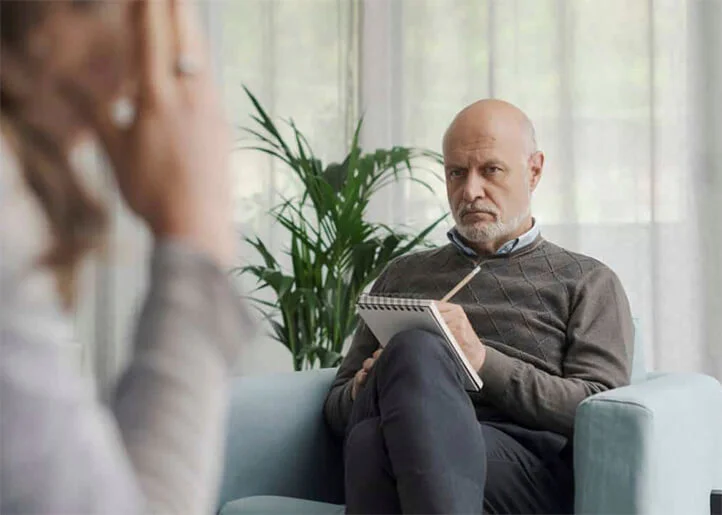Intrusive thoughts are unwanted, unpleasant, persistent, and often disturbing thoughts in the form of words, phrases, images, or scenarios related to a wide range of topics, including control, safety, health, sex, religion, or the meaning of life. These thoughts cause anxiety, making it difficult to dismiss or distract from them.
How to get rid of intrusive thoughts? Where do they come from? Why do I keep thinking about this? Many people ask themselves these questions. The problem of intrusive thoughts is highly relevant in today’s world. Stress, pressures, and worries contribute to the emergence of unwanted thoughts that can be so disturbing that they begin to dominate a person’s consciousness. These thoughts can take various forms, ranging from minor and seemingly insignificant ideas to serious and disturbing judgments that can cause panic or lead to depression.
The problem is further complicated by the fact that a person is generally unable to control these thoughts or simply ignore them. This often leads to the emergence of obsessive behavioral reactions, such as constant hand washing, repeating certain actions, avoiding certain places or situations, and so on.
Intrusive thoughts arise for various reasons and are often associated with individual characteristics or experiences of a person. Here are the main ones:
- Stress and anxiety. Periods of high stress or anxiety can trigger intrusive thoughts related to work, relationships, finances, or other important aspects of life.
- Trauma. Experiencing traumatic events, such as physical or emotional abuse, can lead to the development of intrusive thoughts.
- Depression. Intrusive thoughts are often found in people suffering from depression.
- Uncertainty. Fear of the unknown or feelings of insecurity also give rise to intrusive thoughts.
- Perfectionism. The desire to be perfect in everything often provokes intrusive thoughts about potential mistakes or failures.
- Biological factors. Some studies suggest that intrusive thoughts may be related to certain biological or genetic factors.

The connection between intrusive thoughts and mental disorders
Intrusive thoughts are often associated with various mental disorders.
- Obsessive-Compulsive Disorder (OCD). This is the most well-known disorder associated with intrusive thoughts, which often lead to compulsive actions or rituals, such as excessive hygiene or checking.
- Anxiety disorders. Intrusive thoughts are often present in people with various anxiety disorders, including generalized anxiety disorder, panic disorder, and social anxiety disorder.
- Post-Traumatic Stress Disorder (PTSD). People with PTSD may have intrusive memories of a traumatic event.
- Depression. Intrusive thoughts about suicide, worthlessness, or undesirability are often found in people suffering from depression.
- Eating disorders. Intrusive thoughts about food, weight, or body are often found in people with anorexia or bulimia.
Understanding the causes and finding ways to get rid of intrusive thoughts and manage them more effectively can be achieved with the help of a psychologist, psychotherapist, or psychiatrist. Therefore, do not hesitate to seek help from mental health professionals.

Consequences of Intrusive Thoughts
We all experience intrusive thoughts from time to time. However, when they occur too frequently, their impact on daily life becomes negative. Intrusive thoughts interfere with work, relationships, and overall well-being. Additionally, they often cause stress and anxiety, which in turn makes them even more intrusive, creating a vicious cycle.
In fact, the consequences of intrusive thoughts can be profound and varied. They can cause not only unpleasant physical symptoms, such as headaches, muscle tension, fatigue, or sleep disturbances, but also emotional problems like irritability, depression, or panic attacks.
Moreover, intrusive thoughts can affect self-esteem and confidence. People who do not know how to get rid of intrusive thoughts feel helpless in the face of them, which creates guilt or shame that prevent them from seeking help or support, further exacerbating the problem.
Impact on Mental Health
- Anxiety. Intrusive thoughts inevitably cause anxiety, as a person worries about the possible consequences of their thoughts or actions.
- Depression. A constant feeling of helplessness in the face of intrusive thoughts can lead to depression. The feeling of being unable to control what is happening in one’s mind causes despair and hopelessness.
- Low self-esteem. Intrusive thoughts are often accompanied by feelings of guilt or shame. This can lead to low self-esteem, as a person realizes they cannot control their thoughts or actions.
- Self-criticism. The frequent occurrence of intrusive thoughts can lead to increased self-criticism. A person may begin to see themselves as weak or incompetent due to their inability to control their thoughts.
- Reduced quality of life. Intrusive thoughts make it difficult to concentrate on daily tasks and interfere with normal life activities. This reduces a person’s overall quality of life.
- Stress. Constant tension from struggling with intrusive thoughts can lead to increased stress levels.
- Suicidal thoughts. In some cases, thoughts related to self-harm or suicide may lead to suicidal ideation.
Impact on Daily Life
- Concentration. Intrusive thoughts can make it difficult to concentrate on work, studies, or even during conversations with friends and family. This can lead to reduced productivity and a general sense of dissatisfaction.
- Relationships. Intrusive thoughts often create tension in relationships. A person who feels overly anxious may withdraw from communicating with loved ones, friends, or family.
- Sleep. Intrusive thoughts often disrupt normal sleep. Insomnia, frequent awakenings at night, or nightmares may become commonplace.
- Eating. For some people, intrusive thoughts can cause a loss of appetite or overeating.
- Physical activity. Intrusive thoughts can become an insurmountable obstacle to physical activity. The anxiety or depression they cause can kill motivation for exercise.
Many people seek ways to get rid of intrusive thoughts to improve their daily lives. However, it is important to understand that overcoming them is a process that requires time and patience. There is no quick fix to this problem, and what works for one person may not work for another.
Impact on Relationships with Others
- Communication. Due to constant intrusive thoughts, it is difficult to focus on a conversation, which can create barriers in communication with others.
- Isolation. Feelings of guilt or shame associated with intrusive thoughts may lead a person to avoid communicating with friends and family, ultimately resulting in social isolation.
- Distrust. Intrusive thoughts can breed distrust of others, which can lead to conflicts and tension in relationships.
- Self-criticism. The inability to control one’s thoughts can cause a person to feel unworthy of others or fear that others will judge them because of their thoughts or actions.
- Stress in relationships. Intrusive thoughts create a heightened level of stress, often leading to conflicts and misunderstandings in relationships with others.
All these issues can create serious problems in relationships, both with friends and family members.

How to Get Rid of Intrusive Thoughts: Psychologist’s Advice, Exercises, and Techniques
Intrusive thoughts can significantly limit a person in their daily life, causing anxiety, stress, and even depression. These thoughts are often unconscious and can be related to past traumas or current fears. They can make it difficult to concentrate, affect the quality of sleep, and lead to problems in relationships. While intrusive thoughts are often associated with obsessive-compulsive disorder (OCD), they can occur in anyone in a stressful situation.
Fortunately, there are various methods, strategies, and techniques that psychologists use to help their patients combat intrusive thoughts. However, some of these methods can be used independently as well. I’ll talk about these below.
It’s important to note that if you cannot get rid of intrusive thoughts on your own, that’s perfectly normal. It can indeed be challenging for someone unprepared. Do not despair—simply seek help from a professional. A psychologist, psychotherapist, or psychiatrist can offer additional strategies and support in the process of solving the problem.
Thought-Stopping Technique
The “Thought-Stopping” technique is a popular method used to interrupt intrusive thoughts. This technique involves three main steps:
- Awareness. The first step is to become aware of the intrusive thought. This can be difficult, especially if you are accustomed to a constant flow of negativity in your mind. However, training yourself to be aware of your thoughts is a key step in controlling them.
- Interruption. Once you “catch” the intrusive thought, the next step is to interrupt it. This is easiest to do with a visual or auditory cue. For example, you can imagine a red “Stop” sign or simply say “Stop” out loud or to yourself.
- Replacement. After interrupting the intrusive thought, it needs to be replaced with a more positive or neutral one. This could be something like, “I control my thoughts,” or “This is just a thought, and it has passed.”
This technique requires practice, and at first, it may seem impossible to get rid of intrusive thoughts through interruptions or replacements. However, over time, it becomes easier, and you will notice that your ability to control your thinking improves.
Practice of Meditation and Mindfulness
- Meditation. This ancient practice involves focusing attention and mental attitude. It helps you better understand your thoughts, feelings, and emotions, and creates a distance between yourself and your intrusive thoughts. For example, instead of immediately reacting to an intrusive thought, meditation allows you to slow down and examine it more objectively.
- Mindfulness. This is the practice of being fully present in the current moment, which involves awareness of your thoughts, feelings, bodily sensations, environment, and how they affect your physical and emotional state.
There are different methods of meditation and mindfulness, so it’s important to find the one that suits you best. For example, some people prefer to meditate in silence, while others prefer guided meditation or music. The main principle is the same: to learn to be in the present moment and be aware of your thoughts without judgment or criticism.
Relaxation Techniques
Using relaxation techniques is particularly effective as they help reduce stress and anxiety, which in turn decreases the intensity of intrusive thoughts. Here are some examples:
- Breathing exercises. When you notice intrusive thoughts, try performing a breathing exercise. For example, the “4-7-8” exercise: inhale through your nose while counting to four, hold your breath while counting to seven, then slowly exhale through your mouth while counting to eight. Repeat several times. This exercise helps you focus on your breathing instead of your thought processes.
- Visualization. Try imagining yourself in a place where you feel calm and relaxed. This could be a beach, a forest, mountains, or even a room in your home. Try to feel all the sensations associated with it: smells, sounds, touches on the skin. Such positive and relaxing visualization helps reduce the intensity of intrusive thoughts.
- Progressive muscle relaxation. This exercise involves alternately tensing and relaxing different muscle groups in the body. Start with your feet and gradually move up your body, tensing and then relaxing each muscle group. This exercise helps relieve physical tension, which in turn reduces anxiety and helps eliminate intrusive thoughts.
- Yoga is another way to relax. Yoga poses (asanas) relieve physical tension, and meditative practices help focus and relax. For example, the practice of “Savasana” or “Corpse Pose” helps relax the body and mind, which contributes to reducing the intensity of intrusive thoughts.
Stress Management Techniques
If you are unsure how to get rid of intrusive thoughts, try mastering stress management techniques, as stress often exacerbates these thoughts and makes them difficult to control. Here are some examples of stress management techniques:
- Positive thinking technique involves replacing negative or intrusive thoughts with more positive ones. For example, if you have an intrusive thought that you did something wrong, try replacing it with the thought that you did everything possible given the information and resources you had at the time.
- Relaxation through physical activity, such as running, yoga, or dancing, helps reduce stress and anxiety levels. For example, if you feel that intrusive thoughts are starting to accumulate, take a break from your tasks and dedicate some time to physical activity.
- Deep breathing technique helps activate the parasympathetic nervous system, which reduces stress. For example, when feeling overwhelmed by intrusive thoughts, try focusing on your breathing by taking deep and slow inhales and exhales.
- Time management technique also reduces stress by allowing you to control your day. For example, if you have many tasks to complete and this causes stress and intrusive thoughts, try breaking these tasks into smaller, more manageable parts, and create a plan for completing them.

Professional Help
While many of the strategies and techniques mentioned above are effective, they may not always be sufficient, as intrusive thoughts are often associated with deeper psychological issues such as anxiety disorders, obsessive-compulsive disorder (OCD), or post-traumatic stress disorder (PTSD), which are best treated with professional help. Therefore, seeking professional assistance is often a key factor in overcoming intrusive thoughts.
Obtaining professional help may involve consulting with a psychologist, psychotherapist, or psychiatrist who has experience working with people facing intrusive thoughts or related disorders. These specialists may apply various treatment methods, including cognitive-behavioral therapy (CBT), which has been proven to be an effective tool for addressing these issues.
Additionally, professional help may involve the use of medication therapy. In some cases, antidepressants or anxiolytics are prescribed by a doctor to reduce anxiety symptoms that often accompany intrusive thoughts.
It’s also important to remember that the process of overcoming intrusive thoughts is a long journey, and it’s crucial to be patient and compassionate with yourself throughout this process. Professional help can be invaluable, but it’s also important to have realistic expectations and be prepared for the fact that the recovery process may take some time.
Seeking professional psychological help is a sign of strength, not weakness! Acknowledging that you have a problem that you cannot handle alone and deciding to seek help are important steps on the path to recovery and personal growth.
When Should You See a Psychologist?
Seeing a psychologist is recommended in the following cases:
- When self-help attempts are ineffective. If you have already tried various self-help methods, such as meditation, relaxation techniques, or stress management, and have not noticed significant improvement, this is a sign that you need professional help.
- When intrusive thoughts interfere with daily life. If they become so intense that they interfere with your work, social life, relationships, or other aspects of daily living, it’s time to seek professional help.
- When thoughts become dangerous. If you have thoughts of self-harm, suicide, or harming others, this is a critical signal that you need to seek help immediately.
- When intrusive thoughts are accompanied by other symptoms. If you have other symptoms such as increased anxiety, depression, panic attacks, insomnia, or physical symptoms like chest pain or a rapid heartbeat, this is also a sign that you need professional help.
- When you have a history of mental health disorders. If you have previously had mental health disorders such as depression, bipolar disorder, anxiety disorder, or obsessive-compulsive disorder, this may increase the risk of developing intrusive thoughts. In this case, it is important to consult a professional to develop a treatment plan that considers your medical history and current condition.
Types of Therapy for Overcoming Intrusive Thoughts
- Cognitive-Behavioral Therapy (CBT). This is one of the most effective forms of therapy for treating intrusive thoughts. CBT helps change negative patterns of thinking and behavior.
- Mindfulness Therapy helps individuals learn to observe their thoughts and feelings without judgment or criticism. This helps better understand intrusive thoughts and how they affect behavior.
- Exposure Therapy. This type of CBT involves gradual and controlled exposure to objects or situations that cause anxiety or intrusive thoughts, to reduce the response to these stimuli over time.
- Acceptance Therapy teaches individuals to accept their thoughts and feelings rather than fight them or try to avoid them. This is especially useful for those who find that their attempts to get rid of intrusive thoughts actually intensify them.
- Pharmacotherapy. While not a form of therapy in the traditional sense, antidepressants or anxiolytics can be helpful in reducing symptoms associated with intrusive thoughts. These medications should only be prescribed by a psychiatrist.

Tips from a Psychologist for Maintaining Mental Health
Understanding how to get rid of intrusive thoughts is only part of the larger picture of maintaining mental health, which includes physical exercise, proper nutrition, adequate sleep, stress management, social connections, and other factors that affect our well-being.
- Support from loved ones is a key factor in combating intrusive thoughts. Friends and family can provide the necessary space for you to express your feelings and experiences. They can help maintain a realistic perspective, reminding you of your strengths and the progress you have already made. Support from loved ones also helps alleviate the loneliness that often accompanies intrusive thoughts.
- Healthy habits, such as physical exercise, proper nutrition, good sleep, stress management, and regular practice of meditation or relaxation, strengthen mental health and prevent intrusive thoughts from arising. These habits help reduce anxiety levels, improve mood, and enhance overall mental well-being.
- Self-respect and self-support are also important factors in the process of overcoming intrusive thoughts. This can include recognizing your merits and achievements, practicing self-awareness and self-compassion. We all sometimes feel upset or disappointed. In these moments, it’s especially important to be kinder and more forgiving to yourself.
- Motivation. There are different ways to motivate yourself: setting specific goals or finding sources of inspiration, such as stories of other people who have overcome similar difficulties. It can also be helpful to remind yourself of the positive changes that will occur in your life when you learn to control your thoughts and improve your mental state.




